HGH Levels by Age: What You Need to Know
The older you get, the more your body needs growth hormone. What makes that statement profoundly confusing is the fact that GH production begins to decline around age 30. Aside from puberty, when the body goes through a rapid growth spurt, it is later in life when maintaining proper HGH levels by age is more crucial than ever.

If the body naturally decreases HGH production, why should we worry about growth hormone levels and age?
GH does more than help you reach your adult height. In later years, growth hormone carries out these crucial functions – either directly or indirectly:
- Cellular regeneration – producing new cells to replace those that die off and benefiting the muscles, skin, hair, bones, eyes, nails, internal organs, tissues, and blood
- Metabolism – ensuring proper conversion of food into energy and not fat
- Immunity – keeping your immune system working at optimum performance
- Sexual health – enhancing feelings of desire, arousal, performance, and orgasm intensity
- Sleep and stress – reducing stress and enabling you to fall into a deeper, more restful sleep
- Brain functions – supporting focus, memory, cognitive abilities, and emotional well-being
By understanding the connection between HGH levels and age, you can see how growth hormone helps to keep your body and mind healthy and strong.
How Are HGH Levels Measured?
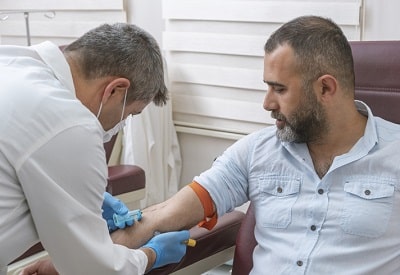 HGH is manufactured in the pea-sized pituitary gland in the brain and then released into the blood for distribution throughout the body. Clinicians, therefore, can effectively measure HGH levels through blood samples. HGH found in the blood is called “circulating HGH.”
HGH is manufactured in the pea-sized pituitary gland in the brain and then released into the blood for distribution throughout the body. Clinicians, therefore, can effectively measure HGH levels through blood samples. HGH found in the blood is called “circulating HGH.”
The unique pattern in which the pituitary gland releases HGH requires a careful clinical approach to get an accurate reading of its function. The pituitary gland releases HGH in pulses, so a single blood sample is sometimes insufficient to see the whole picture. Multiple samples may be necessary.
The two most common clinical tests to diagnose HGH deficiencies are:
- GH stimulation tests. Following a fasting period of approximately 12 hours, an IV is introduced into the patient’s vein to extract a sample. Medicine that stimulates HGH release by the pituitary gland is then administered and measurements are recorded.
| 0 minutes | 30 minutes | 60 minutes | 90 minutes | 120 minutes | |
| Insulin-induced hypoglycemia: | |||||
| Blood glucose (mg/dl) | 94 | 54 | 93 | 99 | 92 |
| Growth hormone (qg/L) | 0.11 | 0.07 | 0.15 | 0.13 | 0.08 |
| Arginine: | |||||
| Growth hormone (qg/L) | 0.11 | 0.26 | 0.39 | 0.28 | 0.17 |
*Typical GH stimulation test results. Note the elevated GH levels 60 minutes into the test.
- GH suppression tests. As blood sugar rises, HGH release is downregulated. To check for a dysfunctional relationship between blood sugar and HGH, a standardized dose of glucose (sugar) is administered and the results are recorded.
| Time to 75 g combined pituitary stimulation test | 0 min | 30 min | 60 min | 90 min | 120 min |
| Glucose (mg/dL) to insulin induced hypoglycemia test | 146 | 103 | 65 | 55 | 78 |
| GH (ng/ml) to insulin induced hypoglycemia test | 14.88 | >40.00 | >40.00 | 36.25 | 24.13 |
| ACTH (pg/ml) to insulin induced hypoglycemia test | 30.8 | 27.4 | 37.4 | 58.1 | 46.2 |
| Prolactin (ng/ml) to TRH stimulation test | 23.88 | 91.08 | 74.89 | 53.13 | 45.17 |
| TSH (qIU/ml) to TRH stimulation test | 2.210 | 11.980 | 12.430 | 9.570 | 7.920 |
| FSH (mIU/ml) to GnRH stimulation test | 59.4 | 68.3 | 79.6 | 91.2 | 95.3 |
| LH (mIU/ml) to GnRH stimulation test | 22.2 | 39.2 | 62.1 | 73.7 | 70.6 |
| GH, growth hormone; ACTH, adrenocorticotropic hormone; TRH, thyrotropin releasing hormone; TSH, thyroid stimulating hormone; FSH, follicle stimulating hormone; GnRH, gonadotropin releasing hormone; LH, luteinizing hormone. | |||||
*Typical GH suppression test results
Occasionally, due to the fact that nearly two-thirds of HGH is released in the initial stages of sleep, doctors may request that patients offer overnight samples taken during this period.
Modern diagnostic equipment and a deepening expertise in endocrine medicine have substantially improved the precision with which an accurate HGH deficiency diagnosis can be made.
Why Does Aging Decrease HGH Levels?
 Growth hormone is not the only one of our chemical messengers to decline with age. Progesterone, testosterone, and estrogen are other hormones that decrease in volume as we get older. Together, these vital hormones impact the integrity of our bodies. Since production of each of these hormones has a lot to do with how well our hypothalamus and pituitary gland operate, it becomes even more important to protect growth hormone levels by age. You see, GH production happens in the anterior portion of the tiny pituitary gland based on signals sent out by the hypothalamus.
Growth hormone is not the only one of our chemical messengers to decline with age. Progesterone, testosterone, and estrogen are other hormones that decrease in volume as we get older. Together, these vital hormones impact the integrity of our bodies. Since production of each of these hormones has a lot to do with how well our hypothalamus and pituitary gland operate, it becomes even more important to protect growth hormone levels by age. You see, GH production happens in the anterior portion of the tiny pituitary gland based on signals sent out by the hypothalamus.
Hormones such as testosterone and GH influence each other’s production. That is why many people with one deficiency often have multiple hormonal imbalances. It is not always necessary to treat each deficiency as one treatment can frequently correct other concerns.
That is the case with insulin growth factor 1. IGF-1, as it is also known, is produced by the liver. Growth hormone receptors on liver tissue receive GH signals that stimulate IGF-1 secretion. If you are GH deficient, you will most likely have low IGF-1 levels. That is also the reason why doctors who order blood tests to check HGH levels by age use the IGF-1 marker. Growth hormone secretion occurs in pulsatile bursts, exiting the bloodstream within minutes of release. IGF-1 levels remain relatively constant in the bloodstream throughout the day.
The somatotropic cells that produce growth hormone function adequately throughout your lifetime. However, they rely on signals from growth hormone-releasing hormone (GHRH) from the hypothalamus to produce GH. The hypothalamus relies on other hormones to stimulate it into secreting vital chemicals that go to the pituitary gland. One such hormone is testosterone, so the vicious cycle continues until a hormone specialist determines what treatment can best put critical levels back into balance.
HGH Levels by Age – Charts for Men and Women
Part of the problem of diagnosing adult growth hormone deficiency lies in the inconsistencies between various labs. It is up to the doctor ordering the blood tests to understand how to interpret the results along with the findings from a physical examination as the individual in question’s symptoms to determine AGHD.
In the below charts of growth hormone levels by age, ng/mL measurements are shown by the high and low end of the normal range. Now, even if you fall within this “normal zone,” you may still have AGHD if you are close to the lower end and exhibiting general symptoms of growth hormone decline.
In both sets of charts for men and women below, we first provide test levels per the Mayo Clinic followed by the range from Quest Labs. You will see how different the ranges appear.
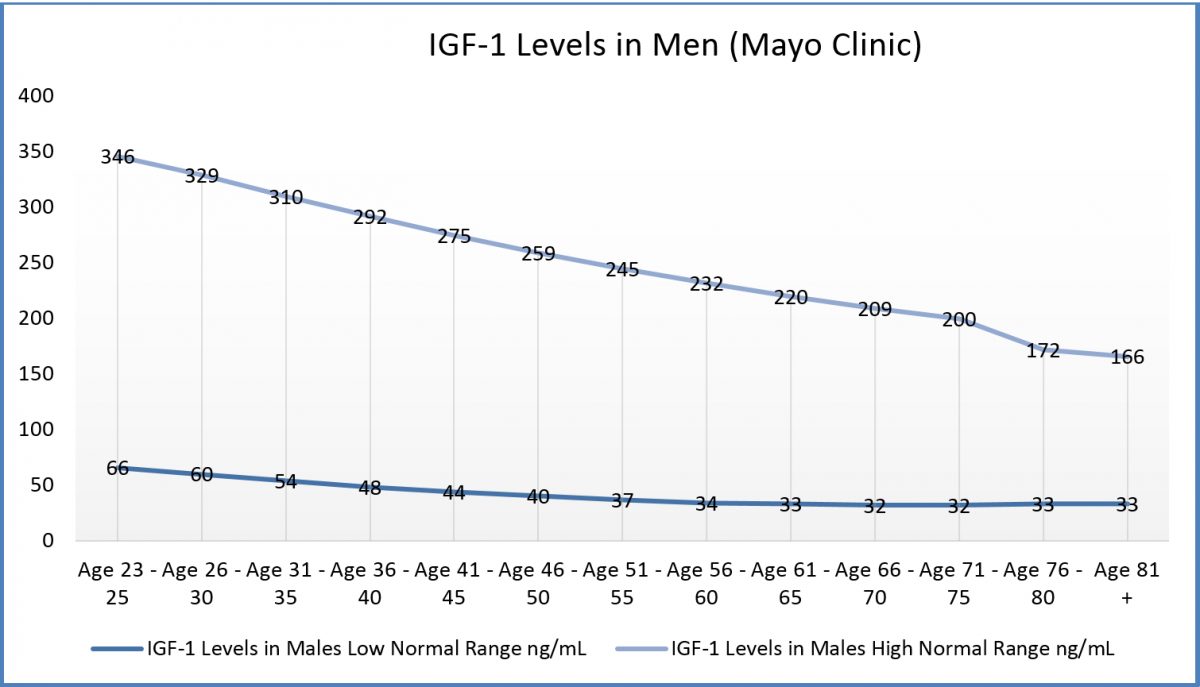
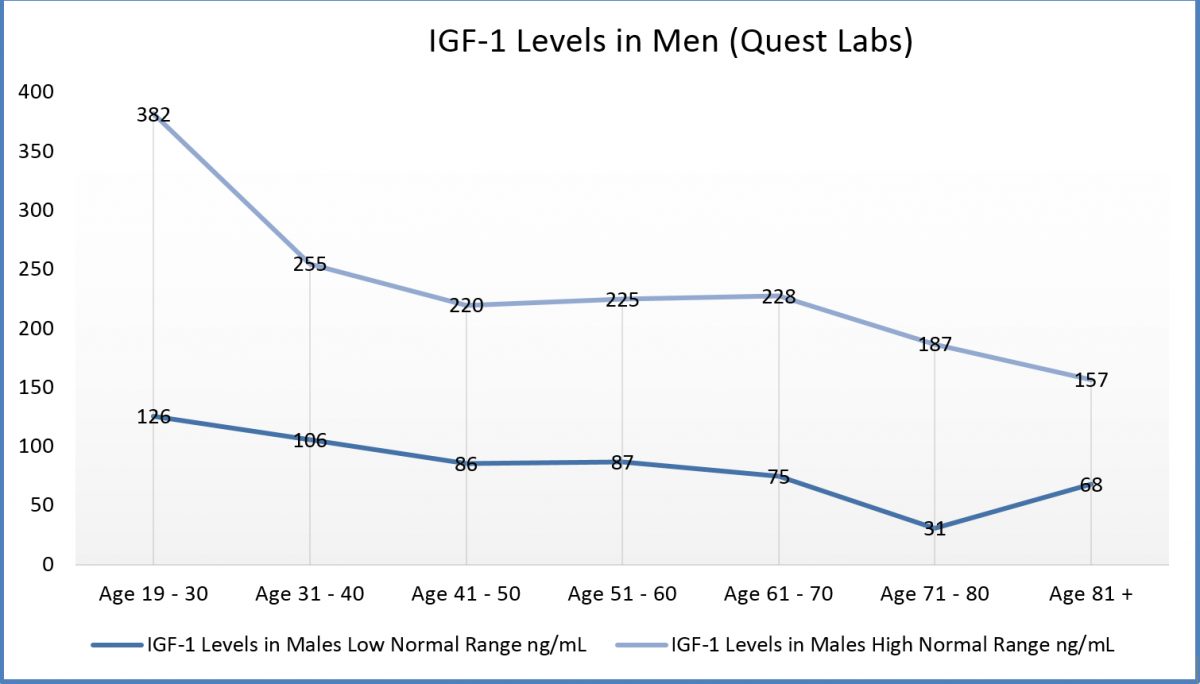
The following charts show HGH levels by age for women:
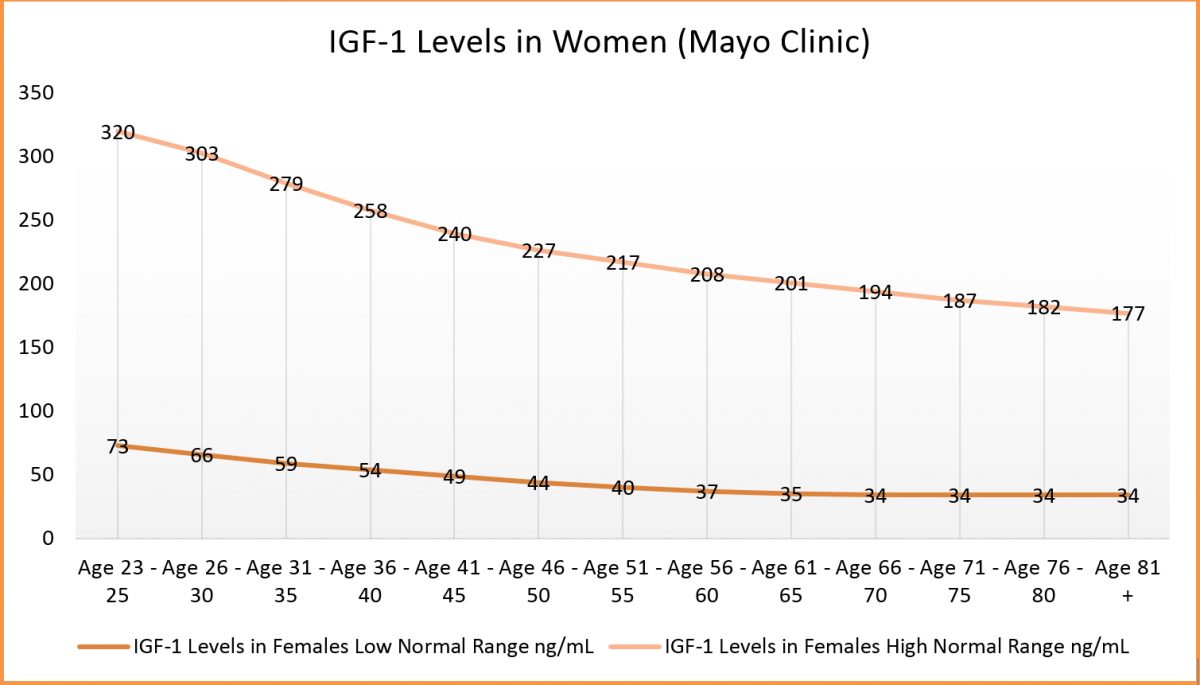
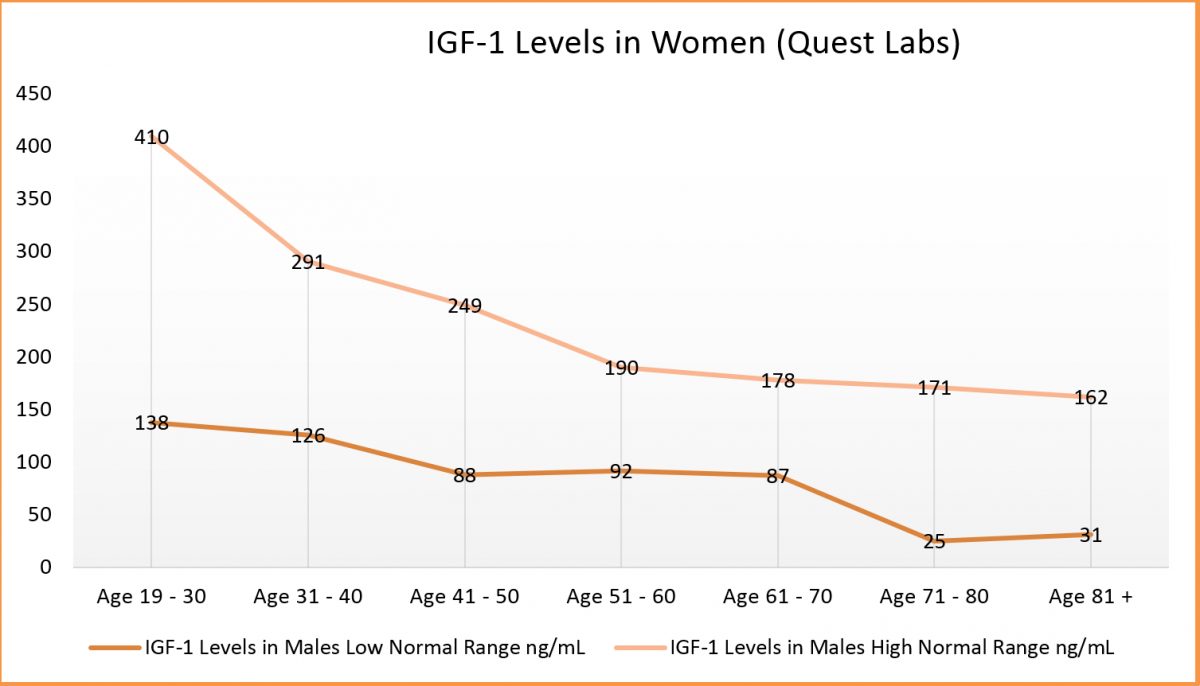
As you can see, the discrepancy can impact your diagnosis. That is why you should always consult with a hormone specialist for testing and treatment of growth hormone deficiency.
How Are IGF-1 Levels Related to HGH Levels?
Insulin-like growth factor 1 – most commonly referred to by its acronym, IGF-1 – is an important hormone that is produced by the liver. IGF-1 and HGH work closely together to stimulate “building” activities in the body such as increasing bone strength, spurring muscle growth, and regulating metabolism.
HGH levels are linked to IGF-1 levels because HGH stimulates the release of IGF-1 by the liver. So, IGF-1 levels rise and fall in direct correlation to circulating levels of HGH. For this reason, in addition to the HGH suppression and stimulation tests, a provider may order an IGF-1 blood test as an auxiliary method to detect an HGH deficiency.
What Do Changing HGH Levels by Age Mean for Your Body?
In the first section, we discussed some of the ways normal growth hormone levels by age can impact the body. Adults with low HGH levels can find themselves constantly tired, gaining weight, and feeling out of sorts. Emotional well-being takes a dive, and many people report feelings of depression and a bleak outlook for the future.
 Bodily aches and stiffness are caused by decreased cellular production for the bones and muscles. Risks for osteoporosis, atherosclerosis, obesity, and type 2 diabetes increase. High cholesterol and blood pressure levels put cardiovascular health in jeopardy. Maintaining normal HGH levels by age is critical to protect healthy brain functions. Low HGH levels can lead to memory loss and possibly even increase the risk of dementia.
Bodily aches and stiffness are caused by decreased cellular production for the bones and muscles. Risks for osteoporosis, atherosclerosis, obesity, and type 2 diabetes increase. High cholesterol and blood pressure levels put cardiovascular health in jeopardy. Maintaining normal HGH levels by age is critical to protect healthy brain functions. Low HGH levels can lead to memory loss and possibly even increase the risk of dementia.
You may find that your sex drive disappears, or that you have trouble in the performance area. Exercise capacity declines, and many individuals report that they lose their drive and productivity. In other words, the overall quality of life becomes diminished.
How Can Individuals Maintain Healthy HGH Levels Naturally?
There are several proven, clinically-backed strategies to maintain HGH levels naturally over the long term. There is no biological law that mandates a drop in HGH levels as humans age.
The most effective methods to keep HGH levels within healthy ranges include:
- Proper sleep. HGH is not released at regular intervals. Rather, the pituitary gland delivers it to the blood in pulses. A huge percentage of the HGH that the pituitary gland produces is released during sleep – in fact, as much as 75% in some cases. The evidence is clear that lack of sleep — a huge health challenge for millions of Americans – is a major contributor to the gradual development of an HGH deficiency. Adequate amounts of sleep, on the other hand, preserve pituitary function and protect hormone health. The best evidence suggests that 7-9 hours of sleep each night is sufficient for maintaining HGH levels in the normal range.
- Healthy diet. Diet significantly impacts hormone health, including HGH levels. The foods we eat — and the nutrients or lack thereof contained within — exert enormous influence over our well-being. Whole foods-based, low-carbohydrate diets abundant in fruits and vegetables with heavy restrictions on processed foods perform best for maximizing hormone health.
- Weight management. A wealth of clinical data indicates a strong correlation between body composition and growth hormone levels. Individuals with higher body fat percentages and lower muscle mass have substantially lower HGH levels on average. Furthermore, weight loss interventions in patients with moderate HGH deficiencies are often successful in restoring HGH levels to normal.
- Exercise. High-intensity training and weightlifting, among other forms of exercise, represent integral components of any HGH-preserving strategy.

The studies generally indicate that resistance training (i.e., weightlifting) works more effectively than long cardio sessions to keep HGH levels in healthy ranges.
What Strategies Can Safely Elevate HGH Levels?
If you’ve been diagnosed with a growth hormone deficiency, you have a range of options to elevate your levels safely.
- Intermittent fasting. Interestingly, emerging research suggests that when we eat seems to matter as much or more for restoring HGH levels to normal than what we eat.
The practice of intermittent fasting, or IF, constrains participants to consuming all of their allotted calories within a daily “window.” The most typical IF protocol entails 8 hours of eating followed by 16 hours of fasting each day. Practitioners call this the 16:8 method.
The most straightforward conceptualization of IF is that it calls for skipping breakfast.
One study of participants undergoing a 3-day fast found that HGH levels more than tripled in the subjects under study. More modest, yet clinically significant, HGH upticks have been recorded for shorter fasts.
- Skip the nighttime snack. When you consume sugar late at night, large quantities of insulin are released to process the intake. Because higher insulin levels inhibit HGH activity, your bedtime snack could seriously hinder your HGH gains.
- Amino acid supplements. In clinical study, amino acids supplements have exhibited a capacity to moderately increase circulating HGH levels. However, oral supplementation alone is usually not enough to achieve long-term gains.
- HGH replacement therapy. While less invasive and more cost-effective measures for elevating HGH levels may be pursued first, many patients with deficiencies ultimately require intravenous HGH replacement therapy.
The practice involves the carefully titrated administration of recombinant (synthetic) human growth hormone over a period of weeks or months, depending on the severity of the deficiency as well as other individual factors. Recombinant growth hormone is known pharmacologically as “somatropin.”
Somatropin is bioidentical, meaning that it resembles natural growth hormone molecularly. For this reason, under the proper conditions, HGH replacement therapy with somatropin is remarkably effective for restoring HGH levels safely in patients affected by deficiencies.
For more information on how HGH levels by age can affect you, please contact our hormone clinic for a free and confidential consultation.

